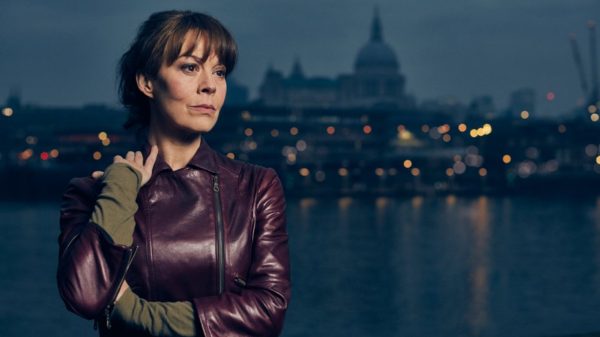When is a normal ITV crime drama not a normal ITV crime drama? In the case of Fearless, it’s when the relatively ‘normal’ case of a dead blonde teenager, an innocent family man and the parade of male predators who may have killed her for the crime of being young and sexually active, is just the tip of an iceberg that includes global conspiracies, framed paedophiles and the war in Iraq.
Fearless is a curious creature, one part Broadchurch and two parts Homeland but really nothing like either. It’s a hodgepodge of different genres and a series that wants at all points to overthrow the tropes of them all. It also feels rather retro in its focus, which is precisely the point.
The 2017 television landscape both here and in the US can’t really be accused of not engaging with current politics, whether that’s social injustice or wider ‘what ifs’ presented by lightweight fare such as Designated Survivor or the unbearably heavy The Handmaid’s Tale. Compared to 2003 – a date thrown around throughout Fearless – though, it seems quite disengaged.
Maybe that’s because, since the dawn of television as a medium for storytelling – far more immediate and intimately viewed than cinema or theatre – there perhaps hasn’t been an event that’s reverberated quite like 9/11 and the years of conflict that followed. Fearless wants to remind us that, while new events have taken over our collective concerns, we’d do well not to forget those times.
What it has over series made at the time, like the 24s of the world or even early seasons of Homeland, is distance. Accusations that politicians may have killed innocent bystanders to clandestine meetings about weapons of mass destruction six weeks before the Iraq war might not have landed quite as well a decade ago, but a six-episode primetime thriller in 2017 seems like the ideal place for it.
We shouldn’t overlook the sheen of prestige that comes with actors like Helen McCrory and Michael Gambon, and both are excellent. McCrory, especially, brings with her enough gravitas and attitude to carry another five series of the show.
Even before the wider concerns of Fearless emerge towards the end of the first episode, a thick air of mistrust hangs over it. The system is corrupt and self-interested, it tells us, and it’s people like Emma Banville who will fight to relieve us from the after-effects of the actions of powerful men. She specialises in getting people off she believes (or tries to believe, anyway) are wrongly convicted.
Kevin Russell was gaslighted into confessing to the murder of a girl he barely knew but had thought nothing of owning revealing pictures of, and because of this a child grew up without a father and a family never knew the truth about their daughter’s death.
Avoidable tragedy, all of it, and it’s not until the series reveals all the pieces of the puzzle that we realise just how far those in power will go to cover up their mistakes.
Linda Simms could (maybe crudely) stand in for the loss of innocence that occurred on a mass scale 15-years ago, and we see so many on both sides of the mystery used as weapons or pawns and discarded as collateral damage. Even our central villain is reminded in one tense scene that the axe doesn’t tend to fall on the generals. In other words, shit runs downhill.
In the end, Fearless may have taken on slightly more than it could ultimately chew, with a final episode more focused on heightened personal drama and convenient reveals than the dominoes it had so carefully lined up over the previous five weeks. What it does right, however, is bring together the three central women circling the conspiracy and pitting them against our final boss – Matthew Wild.
For much of the series I wondered what relevance the key political moments repeated in the series titles had other than to remind us that Emma has far bigger fish to fry than the imprisonment of Kevin Russell, but the reveal that Wild was involved grants it larger meaning.
Blair (or for that matter, Bush) isn’t discussed as directly as we might have imagined given the subject matter of this show, but placing a young, charismatic and handsome man in the role of potential leader of the opposition in a series about the lead-up to the Iraq war in Britain certainly carries some baggage with it. That’s interpretation, of course, but I don’t believe it wasn’t intentional.
But what’s changed? What have we learned? The titles end with images of Brexit and Donald Trump, after all, and there’s no obvious reference to those, either. It serves to transport us into present day immediately before we delve back into the twists and turns of a series resolutely untangling the knots of the country’s past.
We won’t spoil the ending of Fearless, outside of to say it asks enough questions to linger in audiences minds long after the final frame. You can’t fault its lofty ambitions or the palpable feeling of doubt and suspicion it leaves you with.
Fearless is available on DVD now.

